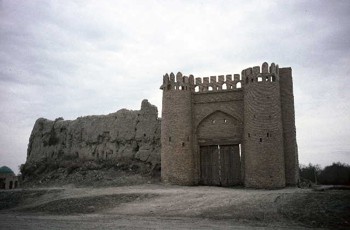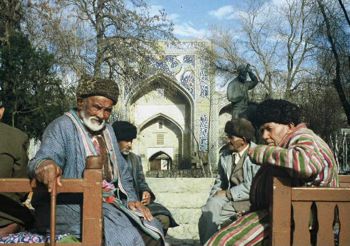Black Sands and Celestial Horses
Extract 2 - Bukhara
The eastern gate of the park gave on to a street leading
straight to the Registan, the old market place. I shivered as I crossed
it. Somewhere here, perhaps under my very feet, lay the bones of Stoddart
and Conolly, those two unfortunates whose names are linked as tragically
- and as heroically - with Bukhara as are those of Mallory and Irvine
with Everest.
It was Conolly himself who coined the term "the Great Game"
for the espionage Cold War carried on by Britain and Russia throughout
the nineteenth century.
Both had their eye on the lucrative markets of Central Asia, then still a collection of Khanates: xenophobic city-states with suspicious, tyrannical leaders who lurked securely behind their enclosing deserts and their centuries-old regimes of absolute power.
But both sides tacitly recognised the potential for a bigger prize: that of control of India, the richest possession of the British Empire, towards which the Russians were slowly and inexorably advancing... For had not Peter the Great reputedly said on his deathbed that the keys to world domination were Constantinople... and India?
So as the Russian frontiers crept south, the Khans quivered with apprehension; while the British played on their fears with overtures of peace and friendship, giving always the hint of better offers to come. It was on such a mission that Lt-Col. Charles Stoddart came to Bukhara at the end of 1838.

Bukhara: The West Gate
Stoddart wasn't the first Englishman to enter Bukhara that century. William Moorcroft, superintendent of the East India Company Stud, on hearing of the almost legendary superiority of the Turcoman horses, had come here twenty years before hoping to buy some. And in 1832 Alexander Burnes - "Bukhara Burnes", as he was to become known - had suborned the Grand Vizier with charm and flattery, and succeeded in seeing much of the city. But Burnes didn't meet the reigning Emir.
"The dissolution of the times, yearly sinking into a deeper slough of vice, venality and superstition, was fitly expressed in the character and reign of... the infamous Nasrullah." Curzon's verdict was, if anything, understated. Nasrullah had murdered several brothers to secure the throne. It was the prelude to a reign fouled with atrocities.
Stoddart was taken prisoner and thrown into the Emir's notorious bug pit, a twenty-foot shaft which Nasrullah kept stocked with parasites, vermin and all manner of creatures even more noxious than himself.
Meanwhile, the British Army took control of Kabul as planned, bringing Bukhara theoretically within reach of an expeditionary force. Nasrullah's confidence wobbled. Forced to embrace Islam, Stoddart was released and lodged with the fawning and duplicitous Topshi-Bashi, or Master of Artillery.
...Stoddart had been captive for more than a year when Captain Arthur Conolly obtained permission to go to Bukhara and try to negotiate his release. Conolly was an adventurer who had already travelled briefly in Turkestan and written a book on his experiences there. He was also an idealist, and nurtured dreams of persuading the warring Central Asian states to unite in a federation for political stability, strength to resist Russia, and trading benefits; even, perhaps, of converting them to Christianity. And there may have been another, less rational, devil to drive Conolly to his death-or-glory expedition. For the woman he dearly loved had just turned him down.
...Britain's adventure in Afghanistan was over. No longer fearing reprisals, Nasrullah could now fully vent his spite on Stoddart and Conolly. He threw them back into the bug pit, where Conolly wrote a diary of his last days in the margin of his prayer book. Before long they were taken out for the last time and, having been made to dig their own graves in the Registan, publicly beheaded. Conolly, according to his Persian servant who lived to tell the tale, was offered his life at the last moment if he turned Moslem. "Stoddart was 'Moslem' for three years," he replied defiantly, "and that did not save him!"
...Two years later, Nasrullah personally cut (the Tophi-Bashi) in half with an axe.
Nasrullah ruled until
1860. When he began to fail, he had his favourite wife executed before
his eyes. He died in his bed.

Regulars at a Bukharan tea-house
Introduction | Extracts | < | > | 1 | 2 | 3 | 4 | 5 | 6 | 7 | 8
Back | Top of Page | Home
see also: http://www.gillsuttle.co.uk
Scimitar Press
Little Mascot
The Doward
Ross-on-Wye
Herefordshire
HR9 6DZ
United Kingdom
Tel. 01600 890730
http://www.scimitarpress.co.uk/
©1998-2012 Scimitar Press
also from Scimitar Press..
![]()
Steppe By Steppe
Mongolia
![]()
Jailbreak
Eastern Europe
also by Gill Suttle...

Between the Desert
and the
Deep Blue Sea
Syria
